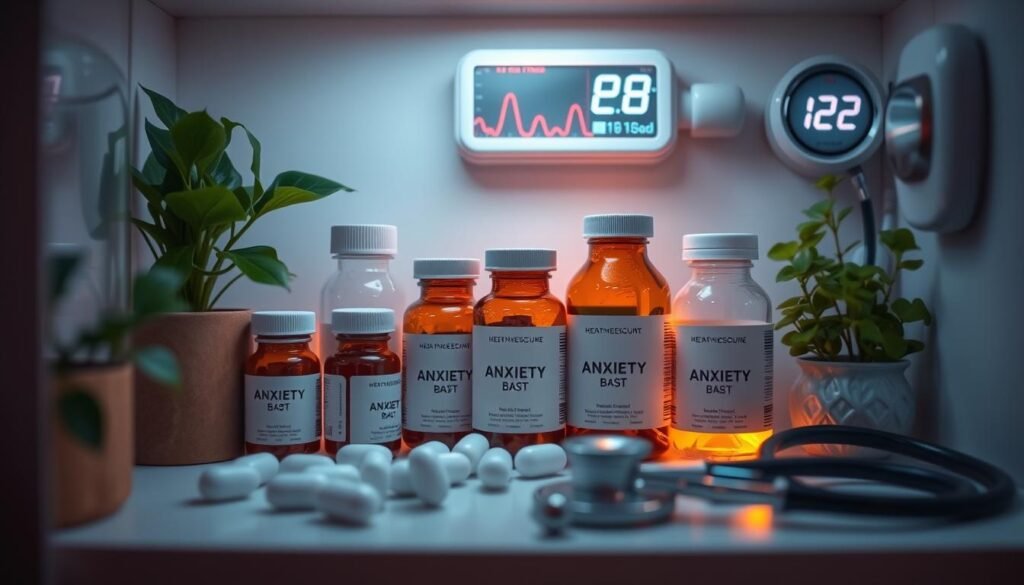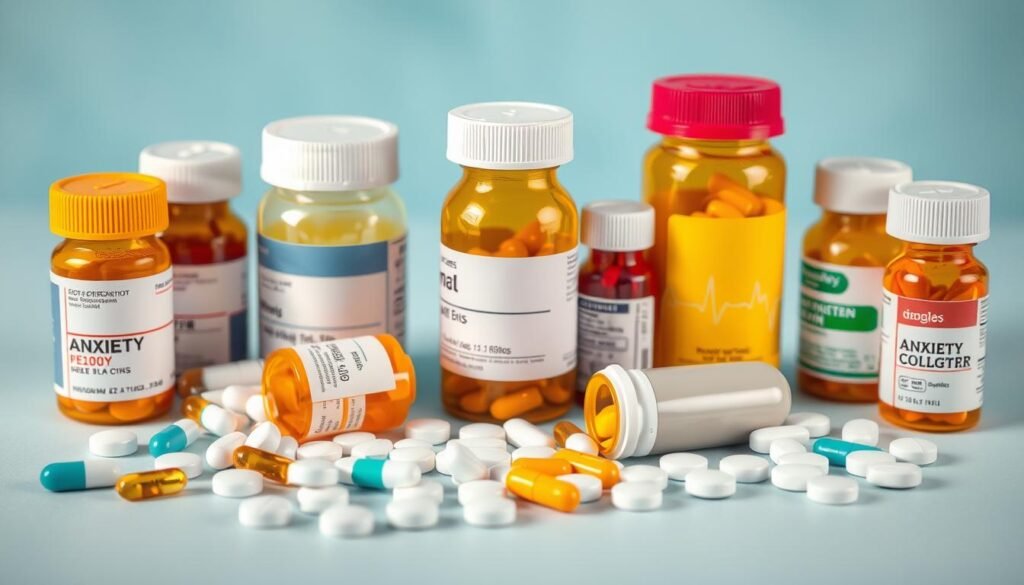More than 40 million adults in the U.S. suffer from anxiety every year. For those also dealing with high blood pressure, finding the right treatment is crucial. This is because having both conditions makes health risks greater.
About 51% of people with pulmonary arterial hypertension also struggle with anxiety. This makes it essential to find good medication options for these patients. Some high blood pressure meds, like beta-blockers, can help with both anxiety and high blood pressure.
This article explores the best medications for anxiety when you also have high blood pressure. It looks at meds that ease anxiety without harming blood pressure levels. Knowing which meds can do both is key for better health, helping patients manage anxiety and hypertension together.
Key Takeaways
- Anxiety and high blood pressure often coexist, requiring concurrent treatment strategies.
- Combined therapies, such as SSRIs with psychotherapy, may provide enhanced effectiveness.
- Common medications like beta-blockers can benefit both mental health and hypertension.
- Management involves continuous monitoring and possibly adjusting treatment plans.
- Lifestyle adjustments play a critical role in supporting both anxiety reduction and blood pressure control.
Understanding the Link Between Anxiety and High Blood Pressure
The connection between anxiety and hypertension is clear. Studies show how chronic stress can affect our long-term health. Anxiety plays a big role in increasing blood pressure. This can make existing problems worse. Stress makes our body go into a fight-or-flight mode. This causes adrenaline to go up, which raises heart rate and blood pressure. The American Heart Association says nearly half the people in the U.S. have high blood pressure. High blood pressure is when readings are 130/80 mmHg or higher.
People with anxiety disorders see their blood pressure go up and down. High anxiety often leads to unhealthy habits. These include not exercising enough, eating poorly, and using substances. The main ways to deal with anxiety are therapy and medicine. Handling these mental health problems can lower hospital visits for heart issues. Effective anxiety management helps with blood pressure and makes life better.
Stress can cause short blood pressure rises. But it might also lead to long-term high blood pressure. To manage both anxiety and hypertension, lifestyle changes are advised. These include working out, eating well, and learning how to handle stress. Exercise, yoga, and meditation are good strategies. They help build up resistance to stress and keep you healthy.
| Factors Affecting Blood Pressure | Anxiety Impact | Management Techniques |
|---|---|---|
| Chronic Stress | Increases heart rate and blood pressure | Stress management, meditation, yoga |
| Poor Diet | May lead to hypertension | Balanced nutrition, reduce salt intake |
| Physical Inactivity | Contributes to both conditions | Regular exercise, physical activity |
| Substance Use | Alcohol and tobacco worsen hypertension | Avoidance and treatment strategies |
Understanding how anxiety and high blood pressure are linked leads to better health care. It invites people to manage these issues actively. This can make our communities healthier.
Why Seek Anxiety Medication for High Blood Pressure?
Managing anxiety and high blood pressure is key for good health. People with both conditions often find that anxiety meds help them feel better mentally and physically. Anxiety can make blood pressure rise and fall, which is bad for the heart. So, taking meds for anxiety is especially important for those who get high blood pressure when stressed.
Anxiety meds can help people with high blood pressure for many reasons. Around half of the adults in the US have high blood pressure, meaning their readings are 130/80 mmHg or more. But, only about 43.2% of people with anxiety get treated, mostly due to stigma or cost. Getting people to consider anxiety meds can lead to a healthier life. It can also prevent serious issues like heart disease or stroke from high blood pressure.
Beta-blockers, a type of medication, are great for reducing anxiety symptoms. They not only cut down on anxiety but also help control blood pressure. Studies show that treating anxiety can reduce the need for emergency heart care.
| Medication Type | Anxiety Medication Benefits | Potential Side Effects |
|---|---|---|
| Beta-Blockers | Reduces physical symptoms of anxiety and lowers blood pressure | Dizziness, fatigue, low blood pressure |
| SSRIs | Effective for long-term anxiety treatment | Weight gain, insomnia |
| SNRIs | Helps in managing anxiety and depressive symptoms | Nausea, dry mouth |
Using anxiety meds can be a good approach for those dealing with anxiety and high blood pressure. Focusing on mental health can improve how we manage blood pressure and our overall well-being.

Best Anxiety Medication for High Blood Pressure
Finding the right anxiety medication for high blood pressure is key for those affected by both. Many people suffer from anxiety disorders. This can push blood pressure up. Certain anxiety meds have been shown to calm symptoms and help with high blood pressure too.
Overview of Common Options
There are a few types of medications for anxiety that also help with high blood pressure. Here are some commonly prescribed ones:
| Medication Class | Examples | Typical Uses |
|---|---|---|
| Selective Serotonin Reuptake Inhibitors (SSRIs) | Citalopram, Escitalopram, Fluoxetine | Chronic anxiety |
| Benzodiazepines | Alprazolam, Diazepam, Clonazepam | Acute anxiety relief |
| Beta-Blockers | Propranolol, Atenolol | Physical anxiety symptoms |
| Buspirone | N/A | Chronic anxiety treatment |
| Antihistamines | Hydroxyzine | Short-term anxiety management |
Benefits of Different Medications
What medication is best depends on the person and their needs. SSRIs are often chosen for long-term anxiety. They work by lifting serotonin levels and steadying mood. Benzodiazepines can quickly ease sudden anxiety but might lead to dependency. They need close watch.
Talking to a doctor before beginning any medicine is very important. This makes sure the treatment fits both your anxiety and blood pressure needs. Adding things like magnesium or practicing mindfulness could also improve treatment, making you feel better overall.

Top Medications for Anxiety and High Blood Pressure
Several medications are key when treating anxiety and high blood pressure together. Knowing about different drugs helps people seeking relief for anxiety while managing hypertension.
Overview of Benzodiazepines
Benzodiazepines are known for quick relief from intense anxiety because of their calming effects. They are usually only given for a short while because they can be habit-forming. Xanax (alprazolam) and Valium (diazepam) are two common types.
These medications work well for anxiety. However, it’s important to use them carefully to prevent addiction.
Effectiveness of Beta-Blockers
Beta-blockers help control physical anxiety signs, such as fast heartbeats and shaking. Propranolol is often chosen to treat symptoms of stage fright. They fight off the hormones that make the heart go fast.
By doing so, they lower blood pressure and help with anxiety at the same time.
Considerations for SSRIs and SNRIs
SSRIs and SNRIs are crucial for long-term anxiety care. Drugs like Lexapro (escitalopram) and Effexor (venlafaxine) are beneficial for treating ongoing anxiety and can also help with high blood pressure in some folks. They need some time to start working, and watching out for side effects is important.
Talking to a healthcare provider is vital for a full understanding of anxiety medications. To find out more about the best anxiety medications, click here.

| Medication Class | Common Brands | Key Benefits |
|---|---|---|
| Benzodiazepines | Xanax, Valium | Rapid anxiety relief |
| Beta-Blockers | Propranolol | Reduces physical anxiety symptoms |
| SSRIs | Lexapro, Zoloft | Long-term anxiety management |
| SNRIs | Effexor, Cymbalta | Treats both anxiety and depression |
Effective Treatments for Anxiety and Hypertension
Finding the right treatments for anxiety and hypertension can really change someone’s life. It’s best to mix lifestyle changes, talking therapies, and medicine. Using both psychotherapy and meds can help with symptoms from both issues.
Beta-blockers are a key type of medicine here. Even though they were first used for heart issues, they now help with anxiety too. For example, Atenolol and Metoprolol slow the heart and ease the mind by blocking stress signals. This not only controls blood pressure but also reduces anxiety signs like sweating and trembling.
Even though beta-blockers don’t solve the mental side of anxiety, they’re great for immediate relief. This is especially true for situations that make us nervous, such as speaking in front of people. With fewer side effects than other anxiety meds, they’re a popular choice. They’re often used in situations that can make people anxious.
For older adults, handling anxiety-driven high blood pressure might include careful use of meds and figuring out stress triggers. Addressing these triggers with therapy or changes in daily habits can be very effective. This can reduce the need for more blood pressure meds.
Talking to healthcare providers is key to see if beta-blockers or other meds are a good fit. This is very important if you already have health issues, as treatment could have risks. A team approach that includes both therapy and medication can be the best way to tackle anxiety and hypertension.
Managing Anxiety with High Blood Pressure Medication
For people with anxiety and high blood pressure, finding the right treatment is key. Many choose to manage anxiety with the help of high blood pressure medication. This method often includes combination therapy, where meds for both issues are used together.
Combination Therapy Approaches
Different medications are combined to treat anxiety and high blood pressure at the same time. Beta-blockers, like propranolol and atenolol, are common choices for easing anxiety. They might work well short-term, much like benzodiazepines. However, they might not be the best for all anxiety types, like social phobias.
With a customized treatment plan, both issues can be addressed together. Keeping track of how medications affect the patient helps find the best mix.
Monitoring Patient Outcomes
It’s important to keep an eye on how well the treatment works. Watching for side effects is part of this process. Beta-blockers might cause tiredness, headaches, feeling dizzy, or having cold hands and feet. Sometimes, they could even make anxiety worse, which means patients need to be watched carefully.
Doctors need to balance the good with the possible bad, like slowed heart rate, low blood sugar, or asthma problems. Regular check-ups help adjust treatment to stay safe and effective.
Recommended Drugs for Anxiety and High Blood Pressure
People with anxiety and high blood pressure have special medication needs. There are drugs that can treat both without harmful side effects.
Propranolol is a top choice for these issues. This beta-blocker controls anxiety symptoms like fast heartbeat and shaking. It’s available in tablet form, slow-release capsules, and liquid, making dose changes easy.
For high blood pressure, adults often start with 80mg twice daily. Anxiety treatment begins at 40mg once a day, possibly going up to 40mg three times a day. Patients older than 65 or with kidney or liver problems may need smaller doses. Always talk to a doctor about the right dose, especially for kids.
SSRIs are also effective for anxiety. They’re the go-to drugs for general anxiety disorder and take a few weeks to work. Treatment usually lasts 6 to 12 months, helping manage anxiety well.
The table below shows how Propranolol and SSRIs are used for anxiety and high blood pressure:
| Medication | Forms Available | Typical Dosage for Anxiety | Typical Dosage for High Blood Pressure | Common Side Effects |
|---|---|---|---|---|
| Propranolol | Tablets, Slow-release capsules, Liquid | 40mg once daily (up to 40mg three times daily) | Starting at 80mg twice daily (max 160mg twice daily) | Tiredness, dizziness, cold fingers or toes |
| SSRIs | Tablets, Capsules | Varies (consult doctor) | N/A (not typically used for BP) | Nausea, insomnia, headache |
Choosing the right anxiety medication is key. Propranolol and SSRIs can have different side effects, from mild to severe. It’s crucial to work with a doctor for a safe and effective treatment plan.
Reducing Anxiety in Patients with High Blood Pressure
To help patients with high blood pressure and anxiety, combine medication with lifestyle changes. Adding lifestyle changes for anxiety management can make a big difference in treatment success. By trying different methods, patients can find ways to lessen anxiety and improve their blood pressure.
Lifestyle Changes that Complement Medication
Some lifestyle tweaks can help ease anxiety in patients with high blood pressure. These changes are helpful:
- Regular Exercise: At least 150 minutes of moderate activity a week can lower both blood pressure and anxiety.
- Nutritious Diet: Eating lots of fruits, veggies, whole grains, and lean meats can help reduce anxiety and improve heart health.
- Quality Sleep: Getting enough good sleep is key for feeling better, both emotionally and physically.
- Mindfulness Practices: Meditation and deep breathing can help calm the mind and decrease stress.
Alternative Therapies for Managing Anxiety
Besides usual treatments, there are other ways to manage anxiety. These options can be helpful:
- Cognitive Behavioral Therapy (CBT): This therapy helps people develop skills to handle anxiety better.
- Mindfulness-Based Stress Reduction: Learning to focus on the now can help ease anxiety.
- Aromatherapy: Scents like lavender can help make you feel relaxed and less anxious.
- Art Therapy: Doing art can be a way to express feelings and reduce anxiety.
These lifestyle changes for anxiety management along with alternative therapies greatly improve health. They help in a broad way alongside medications to boost well-being in those with anxiety and high blood pressure.
Conclusion
Knowing how anxiety and high blood pressure connect is key. A study in 2015 showed people with intense anxiety might face higher hypertension risks. This tells us it’s crucial to spot symptoms early and get help.
Many treatments help with anxiety. Medicines like SSRIs and beta-blockers are important. Adding lifestyle changes and other therapies works best. If symptoms get bad, seeing a doctor right away is critical.
Getting advice that looks at both anxiety and blood pressure helps a lot. This way, treatment can make overall health better and manage issues effectively.